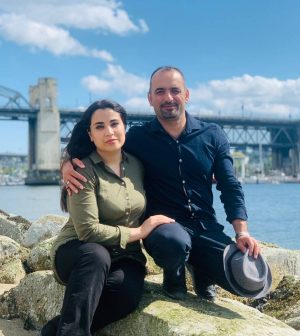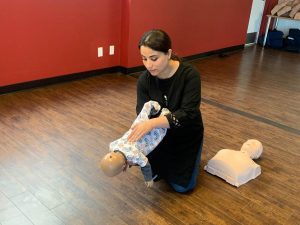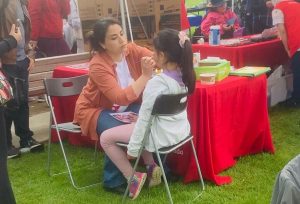- Finding Unshakable Power in a World That Wants to Pull Us ApartPosted 6 months ago
- What could a Donald Trump presidency mean for abortion rights?Posted 6 months ago
- Financial Empowerment: The Game-Changer for Women in Relationships and BeyondPosted 7 months ago
- Mental Health and Wellbeing Tips During and After PregnancyPosted 7 months ago
- Fall Renewal: Step outside your Comfort Zone & Experience Vibrant ChangePosted 7 months ago
- Women Entrepreneurs Need Support SystemsPosted 7 months ago
'Crying with happiness': Afghan campaigner finds freedom in Canada

By Bahaar Joya | Thomson Reuters Foundation
Mujgan Kaveh, who was a women’s rights advocate at home, has retrained as a nurse and is building a new life for her family.
LONDON, Aug 9 (Thomson Reuters Foundation) – As the Taliban mark one year in power in Afghanistan, four Afghans tell the Thomson Reuters Foundation what has happened to them since they fled their homeland.
Women’s rights advocate Mujgan Kaveh, 35, worked in the western Afghan city of Herat for The National Democratic Institute (NDI), a non-profit part-funded by the U.S. government. Her family was initially relocated to North Macedonia, but now lives in Canada where she is training to become a nurse.
This is Kaveh’s story as told to reporter Bahaar Joya.
After the Taliban took power we were put on a U.S. evacuation list because my job with a U.S.-funded organisation promoting women’s rights put my life in danger.
But the Taliban stopped the van taking us to the airport and arrested some passengers. We were very scared and did not return to the airport after that.
Eventually, the NDI and U.S. government arranged for us to be taken to Pakistan and from there to North Macedonia where we were put in a hotel with around 100 families while we waited for our visas.
For the first few weeks these were peaceful days for us because we had been rescued and felt safe.
But the Macedonian police were very harsh and wouldn’t even let us go for a walk. We couldn’t leave the hotel without a police escort and could only go to one particular market just to buy what we needed.
The relocation process was very long and the restrictions began to impact us deeply. Being stuck in a room for months on end with no plan for our future and no news of our final destination was torture.
I dedicated my time to studying and sport, but depression set in. Reading books was my only distraction.

Mujgan Kaveh takes part in a training session as part of her nursing course in Vancouver, Canada, July 26, 2022. Thomson ReutersFoundation/Mujgan Kaveh
While we awaited our visas we were told we could choose between the United States and Canada, which would be quicker. We decided on Canada. We just wanted to find a home and start our lives again.
The last seven months had left us with high levels of anxiety, but the moment we arrived in Canada there was a feeling I cannot explain. I was crying with happiness, knowing that we had finally arrived in a safe place that was going to be our home now.
But at the same time something broke inside me – that whatever I had in Afghanistan was gone forever.
When we started to explore our new surroundings in Vancouver we all had this fear that maybe someone would come and stop us, that maybe the police would arrest us for stepping outside our home. But slowly, slowly we relearnt that it’s normal to go out.
We arrived in Canada in May. For a few days I was in a state of shock as I found myself in a completely new place with a new culture and lifestyle. I found myself jobless and without skills.
I started to think about my position, my office in Afghanistan and how I now had to start from scratch. It was really scary.
I saw many Afghans doing very low-skilled jobs such as taxi driving or just being housewives. I didn’t want this for myself so I decided to retrain as a nurse.
This job makes me feel really good because I can contribute to society and help the country which helped me and my family.
Mujgan Kaveh paints her daughter’s face during a festival in Vancouver, Canada, in June 2022. Thomson Reuters Foundation/Mujgan Kaveh
As a mother and as a woman, I see my future as bright and promising. I have the freedom to be whoever I want to be, wear what I like, and socialise with whoever I want without judgment or discrimination. If I was in Afghanistan I wouldn’t have these opportunities.
I have not worn a hijab since leaving Afghanistan. When I removed my scarf in Pakistan my daughter asked if we would be beaten for not covering our heads. I told her, ‘No, you’re free here darling’.
But the real freedom came when we landed in Canada.
My kids will go to a good school and they will grow up in security. I am deeply happy for my daughter who will grow up in a modern society and will have the freedom that I never had as a young girl in Afghanistan.
My kids already feel that this is their country and are integrating very quickly.
Mujgan Kaveh’s story is part of a series on the Afghans who fled the Taliban and their lives now: A year in exile: Afghan refugees tell of fresh starts
In this series:
Afghan judo champion fights for survival in Pakistan
Afghan Pulitzer-winner buried award before escaping Taliban
Blind Afghan activist who fled Taliban embraces London life
(Reporting by Bahaar Joya @BahaarJ. Editing by Emma Batha and Lin Taylor. Please credit the Thomson Reuters Foundation, the charitable arm of Thomson Reuters, which covers the lives of people around the world who struggle to live freely or fairly. Visit http://news.trust.org)
Our Standards: The Thomson Reuters Trust Principles.







